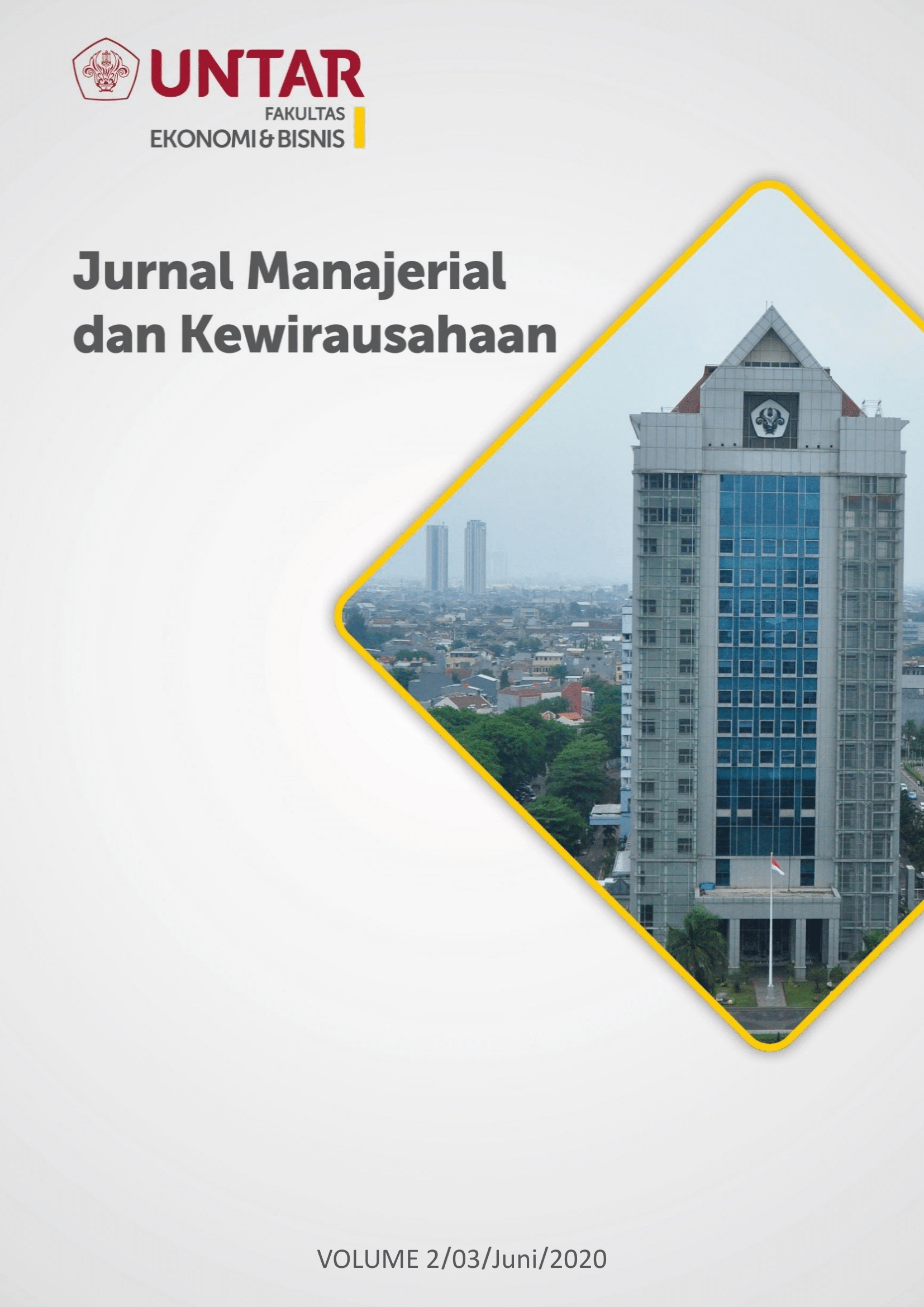Pengaruh Personal Attitude, Subjective Norm, dan Perceived Behavioral Control terhadap Entrepreneurial Intention
Main Article Content
Abstract
This study aims to determine the effect of Personal attitude, subjective norm, dan perceived behavioral control toward entrepreneurial intention. This study uses a quantitative method in which data collected by researchers uses a survey method with the "google form" platform of 80 respondents who are students of the Faculty of Economics and Business, management major at Tarumanagara University (FEB-UNTAR). Furthermore, there are three hypotheses that will be tested by calculating Likert scale data using PLS-SEM. Researcher using non-probability sampling technique with a convenience sampling approach. The data analysis method used by researchers is PLS-SEM which is calculated through the SmartPLS 3 software with bootstrapping method to measure the level of significance. The results of this study indicate that there is a significant positive effect on Personal attitude, subjective norm, dan perceived behavioral control toward entrepreneurial intention.
Penelitian ini bertujuan untuk mengetahui pengaruh Personal attitude, subjective norm, dan perceived behavioral control terhadap entrepreneurial intention. Penelitian ini menggunakan metode kuantitatif di mana data yang dikumpulkan oleh peneliti menggunakan metode survei dengan platform “google form” terhadap 80 responden yang merupakan mahasiswa Fakultas Ekonomi dan Bisnis Universitas Tarumanagara (FEB-UNTAR), Jurusan Manajemen. Selanjutnya terdapat tiga hipotesis yang akan diuji dengan cara mengkalkulasi data berskala Likert dengan menggunakan PLS-SEM. Pengambilan sampel dilakukan dengan teknik non-probability sampling dengan pendekatan convenience sampling. Metode analisis data yang digunakan oleh peneliti adalah PLS-SEM yang dikalkulasi melalui perangkat lunak SmartPLS 3 dengan metode bootstrapping untuk mengukur tingkat signifikansinya. Hasil penelitian ini menunjukkan bahwa terdapat pengaruh positif yang signifikan personal attitude, subjective norm, dan perceived behavioral control terhadap entrepreneurial intention.
Article Details
Section
This work is licensed under a Jurnal Muara Ilmu Ekonomi dan Bisnis Creative Commons Attribution-ShareAlike 4.0 International License.,/p>
References
Ajzen, I. 1991. The theory of planned behavior. Organizational Behavior and Human Decision Processes, 50: 179-211.
Aritonang. R. 2007. Riset pemasaran Teori & praktik. Bogor:
Ghalia Indonesia. Berita Resmi Statistik. 2019. Keadaan ketenagakerjaan Indonesia Februari 2019. Berita resmi statistik : No. 41/05/Th.XXII, 6 Mei 2019. Diakses pada (Mei 12, 2019) dari: BRSbrsInd-20190508080909_rev.
Chin, W.W. 1998. The partial least squares approach for structural equation modeling. in G. A. Marcoulides (Ed.). Modern methods for business research. London: Lawrence Erlbaum Associates.
Douglas, E., & Shepherd, D. 2002. Self-employment as a Career Choice: Attitudes, Entrepreneurial Intentions, and Utility Maximization: Entrepreneurship Theory and Practice, 26(3) 81-90.
Dugassa, Tesema. 2012. Impact of entrepreneurship education on entrepreneurial intentions of business and engineering students in Ethiopia: African Journal of Economic and Management Studies, 3(2), 258 - 277.
Garson, G. D. 2016. Partial Least Squares: Regression & Structural Equation Models. G. David Garson and Statistical Associates Publishing.
Ghozali, Imam. 2015. Aplikasi Analisis Multivariate dengan Program IBM SPSS 23. Semarang : Badan Penerbit Universitas Diponegoro.
Guerrero, M., Rialp, J., dan Urbano, D. 2006. The impact of desirability and feasibility on entrepreneurial intentions: A structural equation model: International Entrepreneurship and Management Journal, 4, 35-50.
Hair, J. F., Ringle, C. M., & Sarstedt, M. 2011. PLS-SEM: Indeed a silver bullet. Henseler, J. Ringle, C.M. & Sinkovicks, R.R. 2009. The use of partial least square modeling in international marketing. New Challenges to International Marketing Advances in International Marketing, 20, 277-319.
Hsu, M. H. And Chiu, C. M. 2002. Predicting Electronic Service Continuance with a Decomposed Theory of Planned Behavior. Behavior dan Information Technology.
Jhingan, M.L.1999. Ekonomi Pembangunan dan Perencanaan. Jakarta: Penerbit Rajawali Pers.
Jogiyanto, Hartono. 2007. Model Kesuksesan Sistem Teknologi Informasi. Yogyakarta: Andi. Kolvereid, L. dan Isaksen, E. 2006. New business start-up and subsequent entry into selfemployment. Journal of Business Venturing, 21(6), 866–885. Retrieved from: https://doi.org/10.1016/j.jbusvent.2005. 06.008.
Liñán, F dan Santos, F. 2010. Gender differences in entrepreneurial intentions: An international comparison: Working paper, Sevilla, Spain.
Malhotra, Naresh K. 2009. Riset pemasaran pendekatan terapan. jilid 1. Jakarta: PT Index. _______. 2010. Marketing Research An Applied Orientation. Sixth Edition. New Jersey: Pearson.
Margono. 2004. Metodologi Penelitian Pendidikan. Jakarta: PT Rineka Cipta.
Miller, B. K. dkk. 2009. Predictors of entrepreneurial intentions: A quasi-experiment comparing students enrolled in introductory management and entrepreneurship classes. Journal of Business and Entrepreneurship, 21(2), 39–62. https://doi.org/10.1017/CBO9781107415324.004.
Roy, R., Akhtar, F., & Das, N. 2017. Entrepreneurial intention among science & technology students in india: Extending the theory of planned behavior. International Entrepreneurship and Management Journal, 13(4), 1013-1041. doi:http://dx.doi.org/10.1007/s11365-017-0434-y
Schermerhorn, John D., James G Hunt, Richard N Osborn. 2002. Organizational Behavior. New York: John Willey and Son Inc.
Sugiyono. 2011. Metode Penelitian Kuantitatif Kualitatif, dan R&D. Cetakan ke- 14. Bandung: Alfabeta.
Sun, H., Lo, C. Tung., Liang, B., & Wong, Y. L. B. 2017. The impact of entrepreneurial education on entrepreneurial intention of engineering students in hong kong. Management Decision, 55(7), 1371-1393. Retrieved from https://search.proquest.com/docview/1929855111?accountid=45753.
Untoro, Joko. 2015. Ekonomi. Jakarta: Kawah Media.
Usman, B. dan Yennita. 2019. Understanding the entrepreneurial intention among international students in turkey. Journal of Global Entrepreneurship Research, 9(1), 1. Retrieved from: http://dx.doi.org/10.1186/s40497-018-0136-0.
Zewudu, W., M.B.A., & Alamnie, M. 2017. Determinants of entrepreneurial intention of graduating students at Bahirdar university: An application of theory of planned behavior. Arabian Journal of Business and Management Review (Oman Chapter), 7(1), 31-50. Retrieved from doi:http://dx.doi.org/10.12816/0041746.

